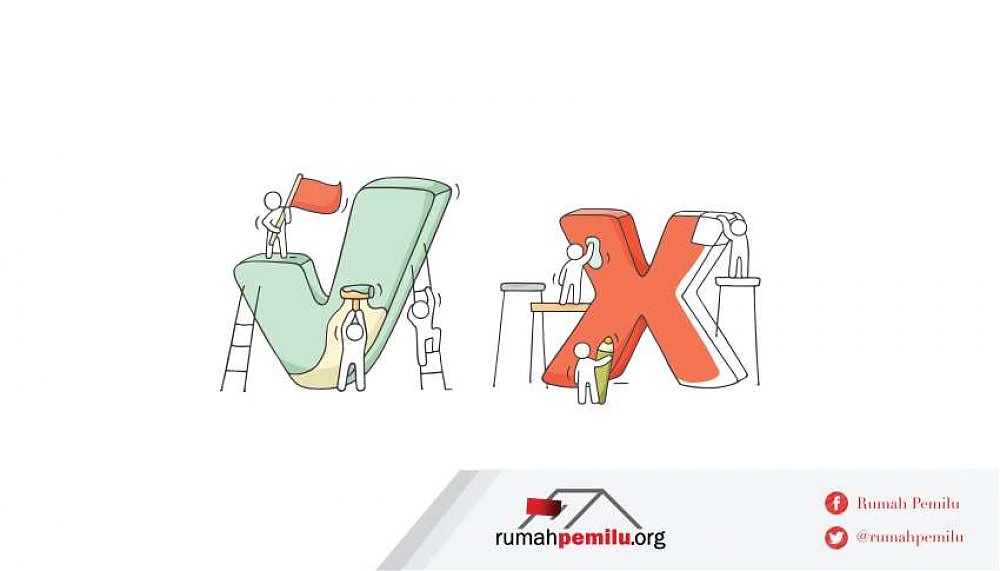Limited access and obscurity of election information can cause voters not to be recorded in the voter register or even unable to vote. The lack of official information that is known to a person will also make him vulnerable to false information that distorts the decision to vote.
The advent of the internet and social media has brought about fundamental changes to the way information is produced, communicated and distributed. The way people disseminate and consume political information is also changing. In addition to bringing positive changes, the emergence of the internet and social media also has a negative influence, especially on the emergence of information disorder.
There are three types of information disorder: misinformation, disinformation, and mal-information. Disinformation is false information that is intentionally created to harm a person, social group, organization, community, or country. Misinformation is false information created not to cause harm. People who spread misinformation believe that the information is true, without intending to harm others. While mal-information is information based on facts that is used to harm a person, organization, community, or country (Wardle & Derakhshan, 2017).
In Indonesia, there are two types of election information disorder: obfuscation of information on technical electoral procedures and disinformation that delegitimizes the electoral process.
Obfuscation of information on technical electoral procedure
Information on technical electoral procedures that not in accordance with the official information revolves around several themes. First, technical voting. Second, the required documents that must be brought to be able to vote at the TPS. Third, voting time. Fourth, other topics related to the holding of voting.
This disinformation and misinformation not only confuses voters, but also ad hoc election organizers. False information received by KPPS has disrupted voting rights. For example, disinformation regarding the required documents to be brought when voting at a polling station. Based on Article 28 paragraph (3) of PKPU No.3/2019 concerning Voting and Counting in Elections, as well as Article 14 paragraph (4) of PKPU No.18/2020 concerning Voting and Counting in Regional Elections, C6 Form or an invitation letter to vote is indeed a one of the documents submitted to the KPPS in addition to an electronic ID card or other permitted identity, but an invitation to vote is not a mandatory document as a condition for receiving a ballot if the voter's name can be found in the DPT. The existence of disinformation caused KPPS to only issue ballots to voters who brought C6 Form.
The same thing happened when KPPS was exposed to disinformation and misinformation that voters who moved to vote could only be served after 12 noon. This is detrimental to voters moving to vote registered in the Additional Voters List (DPTb). In fact, Article 8 paragraph (14) of PKPU No. 3/2019 concerning Vote Polling and Counting in Elections states that transfer voters can be served from 7 am to 1 pm.
Likewise in the case of mental disability voting rights. The existence of disinformation and misinformation regarding the requirements for a health certificate for voters with mental disabilities received by KPPS causes the voting rights of mentally disabled voters to be lost. Article 4 paragraph (3) PKPU No. 8/2016 concerning Updating of Data and Voter List in Regional Head Elections states that to be able to exercise their right to vote at TPS, mental disabilities do not need to show a health certificate from a doctor. A doctor's certificate is actually intended for mental disabilities who are mentally disturbed so that they are unable to exercise their right to vote.
Disinformation that delegitimizes the electoral process
Disinformation that aims to delegitimize the electoral process also has the potential to interfere with the right to vote. The phenomenon of massive disinformation with this aim has even become a global issue. Disinformation that aims to delegitimize the electoral process has a significant impact on the decline of public confidence in elections and democratic institutions. In fact, disinformation that attacks election organizers is able to delegitimize the election process, and often leads to electoral chaos that results in demonstrations and the destruction of various state facilities
Disinformation that delegitimizes the election process can be mapped into two categories, namely attacking the election organizers and attacking the credibility of the implementation of the stages. The topics of disinformation that attack election organizers are related to the independence of election organizers (both members and institutions) and the alignment of election organizers to certain candidates. Meanwhile, the topics of disinformation that attack the credibility of the implementation of the election stages are related to frauds in the implementation of the election stages; foreign intervention in the implementation of the election stages; and suffrage discrimination.
Regarding the form of confusion of election information, efforts such as digital literacy, providing adequate election information, and taking action against disinformation have been carried out. However, none of these efforts are specifically focused on protecting one's right to vote. Special protocols for handling disinformation that can eliminate a person's right to vote are urgently needed.
MAHARDDHIKA & NURUL AMALIA SALABI
We map out the forms of voter suppression or interference with the right to vote in the Indonesian election. This article is the third in the series. Check out the articles in this series:
- Article I: Mapping the Forms of Voter Suppression in Indonesian Elections
- Article II: Provisions in Election Regulations that Have the Potential to Eliminate Voting Rights
- Article III: Intimidation and Challenge of Voting Right in Indonesian Elections
- Article IV: Election Information Disorder, Eliminating Voting Rights











